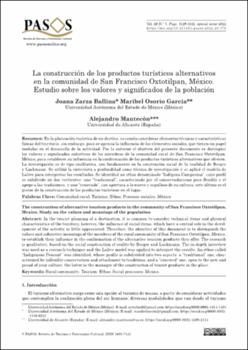La construcción de los productos turísticos alternativos en la comunidad de San Francisco Oxtotilpan, México. Estudio sobre los valores y significados de la población
Fecha
2022Resumen
En la planeación turística de un destino, es común considerar elementos técnicos y características
físicas del territorio, sin embargo, poco se aprecia la influencia de los elementos sociales, que tienen un papel
medular en el desarrollo de la actividad. Por lo anterior el objetivo del presente documento es distinguir
los valores y significados subjetivos de los miembros de la comunidad rural de San Francisco Oxtotilpan,
México, para establecer su influencia en la conformación de los productos turísticos alternativos que ofrecen.
La investigación es de tipo cualitativa, con fundamento en la construción social de la realidad de Berger
y Luckmann. Se utilizó la entrevista a profundidad como técnica de investigación y se aplicó el modelo de
Lalive para interpretar los resultados. Se identificó un ethos denominado “Indígena Campesino”, cuyo perfil
se subdivide en dos vertientes: uno “tradicional”, caracterizado por el conservadurismo poco flexible y el
apego a las tradiciones, y uno “renovado”, con apertura a lo nuevo y orgulloso de su cultura; este último es el
gestor de la construcción de los productos turísticos en el lugar. In the tourist planning of a destination, it is common to consider technical items and physical
characteristics of the territory, however, the influence of social items, which have a central role in the development
of the activity, is little appreciated. Therefore, the objective of this document is to distinguish the
values and subjective meanings of the members of the rural community of San Francisco Oxtotilpan, Mexico,
to establish their influence in the conformation of the alternative tourism products they offer. The research
is qualitative, based on the social construction of reality by Berger and Luckmann. The in‑depth
interview
was used as a research technique and the Lalive model was applied to interpret the results. An ethos called
“Indigenous Peasant” was identified, whose profile is subdivided into two aspects: a “traditional” one, characterized
by inflexible conservatism and attachment to traditions, and a “renewed” one, open to the new and
proud of your culture; the latter is the manager of the construction of tourist products in the place.





